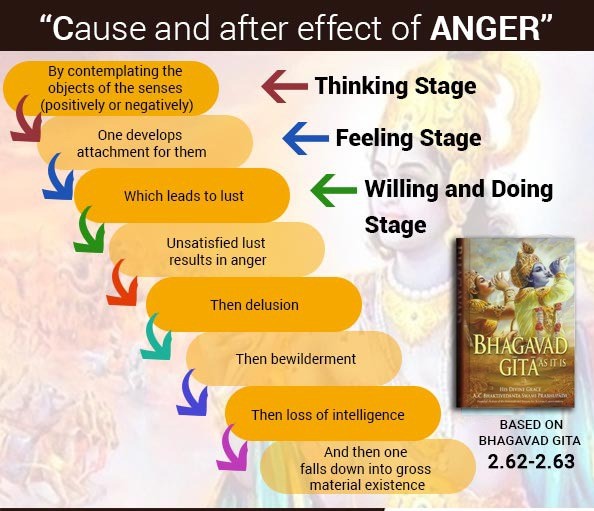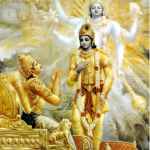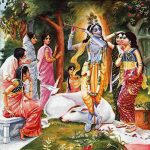How to overcome distress – The material world is a world of duality. Can you think of anyone who never had any distress in life? Either someone has financial distress, or family distress, or work stress. If one is lucky not to have any of these, there would be health issues, old age catches up, some near and dear one meet an accident. Sometimes, this distress can take extreme form, and put one in complete delusion in one’s path of duty. In fact, the setting of Bhagavad Gita starts with the distress of Arjuna. He is the greatest warrior world has ever seen. Still, he meets a situation where he has to fight his relatives and teachers, and he is confused about his duty and has lost all his composure.
So, what can one do in such a situation? We will try to gather some insights from the wisdom of Bhagavad Gita in Chapter 2, that is, how Lord Krishna tried to pacify Arjuna. This chapter very meticulously describes the reasons for such a situation and what is the remedy.

Table of Contents
Happiness and distress are alike summer and winter
Krishna very clearly tells Arjuna that the feeling of happiness and distress arises from the so-called sensory perception. Sensory perception is giving Arjuna a lot of distress and that is why he is under depression. Krishna compares this feeling of happiness and distress with summer and winter. Just like you tolerated summer, and then you have to tolerate winder. Similarly, you have to tolerate both happiness and distress. Neither summer nor winter lasts forever, and so are the happiness and distress, which arise out of sense perception.
O son of Kuntī, the nonpermanent appearance of happiness and distress, and their disappearance in due course, are like the appearance and disappearance of winter and summer seasons. They arise from sense perception, O scion of Bharata, and one must learn to tolerate them without being disturbed. [BhG 2.14]
I am not the body, I am the soul
This is the very basis of Vedanta knowledge. Krishna tells Arjuna — why are you lamenting that you are going to kill someone or you will be killed? Noone can kill anyone. Vedanta knowledge talks about the soul, which cannot be destroyed. Krishna in fact describes this very elaborately in this chapter. Let us look at some of the verses.
“As the embodied soul continuously passes, in this body, from boyhood to youth to old age, the soul similarly passes into another body at death. A sober person is not bewildered by such a change.” [BhG 2.13]
“Those who are seers of the truth have concluded that of the nonexistent [the material body] there is no endurance and of the eternal [the soul] there is no change. This they have concluded by studying the nature of both.” [BhG 2.16]
“For the soul there is neither birth nor death at any time. He has not come into being, does not come into being, and will not come into being. He is unborn, eternal, ever-existing and primeval. He is not slain when the body is slain.” [BhG 2.19]
This is an eye-opener. Aren’t we always in distress because of the conditions connected with the impermanent material body?
So, how is my duty important?
This is a very crucial question. If the body and the bodily connections are impermanent, do I need to worry about my duty? In fact, Arjuna wanted to go to the forest and did not want to fight. Krishna discards this idea in very strong words, “Considering your specific duty as a kṣatriya, you should know that there is no better engagement for you than fighting on religious principles; and so there is no need for hesitation.” [BhG 2.31]
But then, what is the difference between one fighting with the knowledge of permanence and without this knowledge? Krishna explains this in various verses. Here is one of the most famous verses from Bhagavad Gita, “karmaṇy evādhikāras te mā phaleṣu kadācana”, “You have a right to perform your prescribed duty, but you are not entitled to the fruits of action. Never consider yourself the cause of the results of your activities, and never be attached to not doing your duty.” [2.47]
And the following verse:
“Perform your duty equipoised, O Arjuna, abandoning all attachment to success or failure. Such equanimity is called yoga.” [2.48]
So, the difference is very clearly explained. One has to perform the prescribed duty but without attachment to results, without considering loss or gain, victory or defeat. When one can do that in equanimity, this is the same as Yoga. That is very profound. So, one does not have to go to the forest; one can perform one’s prescribed duties while being equipoised, and he is stated in Yoga.
What is the goal of my duty if I have to remain unattached to the results?
Now, this looks like a dilemma. In general, all our works are in consideration of the result. Krishna tells this mentality to be that of a miser. Even many people worship demigods to derive various benefits out of such worship. They have also been called miser by Krishna. So, if I want to enjoy the results of my work, I am a miser; but if instead, I perform my duties taking Krishna’s dictation, that is Yoga. Victory or defeat is Krishna’s concern; not mine. By following Krishna consciousness, one can give up the false proprietorship and act as an instrument of God, being unattached to the results. Krishna mentions that this is the way one can free oneself from this vicious cycle of birth and death.
By thus engaging in devotional service to the Lord, great sages or devotees free themselves from the results of work in the material world. In this way they become free from the cycle of birth and death and attain the state beyond all miseries [by going back to Godhead]. [BhG 2.51]
When your mind is no longer disturbed by the flowery language of the Vedas, and when it remains fixed in the trance of self-realization, then you will have attained the divine consciousness. [BhG 2.53]
How do we attain the divine consciousness?
So, following Krishna’s advice, we can actually attain divine consciousness. Krishna further explains this in various verses and the essence is not to be affected by whatever good or evil one may obtain during his course of prescribed duty.
O Pārtha, when a man gives up all varieties of desire for sense gratification, which arise from mental concoction, and when his mind, thus purified, finds satisfaction in the self alone, then he is said to be in pure transcendental consciousness. [BhG 2.54]
One who is not disturbed in mind even amidst the threefold miseries or elated when there is happiness, and who is free from attachment, fear and anger, is called a sage of steady mind. [BhG 2.56]
In the material world, one who is unaffected by whatever good or evil he may obtain, neither praising it nor despising it, is firmly fixed in perfect knowledge. [BhG 2.57]
Further, Krishna tells about withdrawing senses from sense objects; and thus giving up all varieties of sense gratification.
One who is able to withdraw his senses from sense objects, as the tortoise draws its limbs within the shell, is firmly fixed in perfect consciousness. [BhG 2.58]
Why to practice sense control?
This is one of the main practices of various Yoga systems — sense control, or to restrain the senses. Why is that needed? What is the issue with unrestricted sense enjoyment? Shouldn’t I get all the freedom I wish? Bhagavad Gita mentions that this is a royal road to hell and how, when we keep contemplating on sense objects, it ends in complete bewilderment.
While contemplating the objects of the senses, a person develops attachment for them, and from such attachment lust develops, and from lust anger arises. [BhG 2.62]

From anger, complete delusion arises, and from delusion bewilderment of memory. When memory is bewildered, intelligence is lost, and when intelligence is lost one falls down again into the material pool. [BhG 2.63]
Krishna emphasizes the need for sense control to achieve steady intelligence: “A person who is not disturbed by the incessant flow of desires – that enter like rivers into the ocean, which is ever being filled but is always still – can alone achieve peace, and not the man who strives to satisfy such desires.” [BhG 2.70]
How to practice sense control?
Now that we see the necessity, how to actually practice sense control? It looks so difficult. Senses are always looking for sense objects. Will the restrain work? Actually, Krishna says that restrain is not helpful as the taste for the sense objects is still there.
“Though the embodied soul may be restricted from sense enjoyment, the taste for sense objects remains. But, ceasing such engagements by experiencing a higher taste, he is fixed in consciousness.” [BhG 2.59]
In our normal dealings as well, we do not give up something unless we get something better. So, Krishna gives a nice solution for sense control — to practice devotional service and experience a higher taste. Spiritual life is meant to provide a higher taste, and that will help us get rid of lower taste of sense gratification.
Conclusion
The crux of Bhagavad Gita lies in the fact that while Arjuna was in distress, he surrendered to Lord Krishna, Lord Krishna then revealed this knowledge of Bhagavad Gita to him. We should, similarly, accept the instructions of Bhagavad Gita to get rid of our illusion. We need to clearly understand the difference between permanent and impermanent, and not be affected by temporary feelings of happiness and distress, arising out of sense perception. Underlying this is the need for sense control; not by restraining the senses but by practicing devotional service to experience a higher taste. This will help us perform our prescribed duty as an instrument of God, without being affected by the results in the form of temporary happiness and distress.




